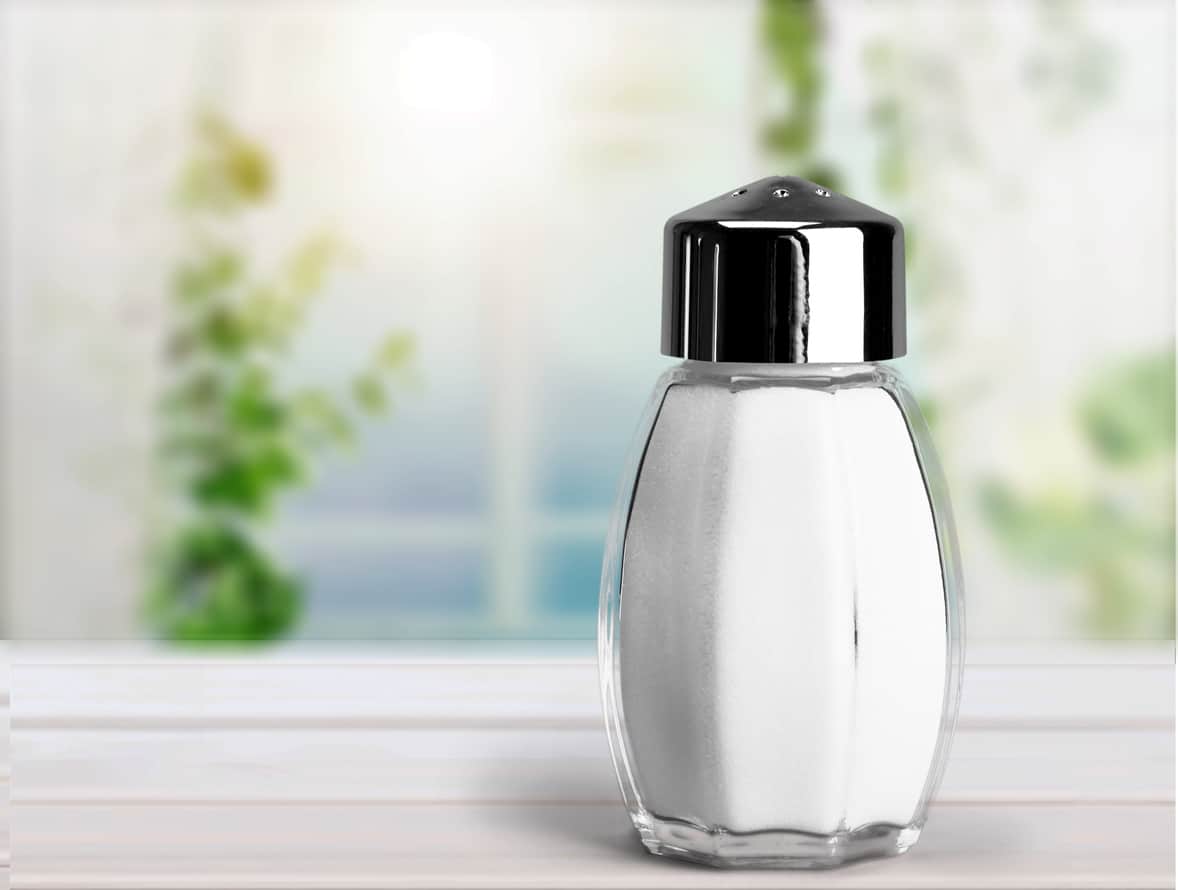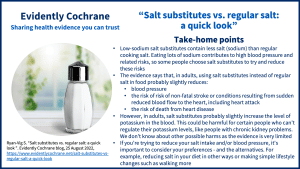In this short blog, Selena Ryan-Vig looks at the evidence on using low-sodium salt substitutes instead of regular salt. Can salt substitutes reduce blood pressure and prevent heart attacks, and are there any risks?
Take-home points
The evidence comes from a Cochrane ReviewCochrane Reviews are systematic reviews. In systematic reviews we search for and summarize studies that answer a specific research question (e.g. is paracetamol effective and safe for treating back pain?). The studies are identified, assessed, and summarized by using a systematic and predefined approach. They inform recommendations for healthcare and research.* and is relevant to adults in the general populationThe group of people being studied. Populations may be defined by any characteristics e.g. where they live, age group, certain diseases.. Most of the studies included some people with high blood pressure.
The evidence is not relevant to:
- pregnant women – as none of the studies included them
- children – as very few children were included in the studies
- people where high potassium intake is known to be harmful, such as people with kidney problems or on certain medications. (This is because salt substitutes contain potassium – so these people were excluded from the studies for safetyRefers to serious adverse effects, such as those that threaten life, require or prolong hospitalization, result in permanent disability, or cause birth defects. reasons)
What are low-sodium salt substitutes?
Low-sodium salt substitutes (also known as ‘salt substitutes’ or ‘reduced sodium salt’) are like regular cooking salt, but contain less sodium. To reduce the sodium in salt substitutes, some of the sodium is replaced with potassium or other minerals.
Eating lots of sodium, and not enough potassium, can lead to high blood pressure. In turn, this can cause heart problems such as stroke. So the idea is that using salt substitutes – instead of regular salt – might reduce blood pressure and the riskA way of expressing the chance of an event taking place, expressed as the number of events divided by the total number of observations or people. It can be stated as ‘the chance of falling were one in four’ (1/4 = 25%). This measure is good no matter the incidence of events i.e. common or infrequent. of heart problems.
You can buy salt substitutes in supermarkets – but do they have benefits and are they safe?
Making a choice? Think BRAIN!
It can be helpful to think BRAIN: What are the Benefits, Risks, Alternatives, what do I want and what if I do Nothing?
What are the benefits of salt substitutes?
The evidence says that, in adults, using salt substitutes instead of regular salt in food probably slightly reduces:
- blood pressure
- risk of non-fatal stroke or conditions resulting from sudden reduced blood flow to the heart, including heart attack
- risk of death from heart disease
Are there any risks?
If you’re making any change to your diet, it’s a good idea to find out whether it could have unwanted effects (harms).
The evidence says that using salt substitutes instead of regular salt probably slightly increases the level of potassium (a mineral that keeps your heart beating at the right pace) in adults’ blood. This could be harmful for people who can’t regulate their potassium levels, such as people with kidney problems or on certain medications.
Other evidence on safety is very limited – so we don’t know about other possible harms.
What are the alternatives?
There are other ways to reduce your salt intake – and your blood pressure – without using salt substitutes.
Besides reducing salt in your diet, there are other ways you could reduce your blood pressure without medication. For example, moderate-intensity walking (three to five times per week, for 20 – 40 minutes) can likely help. Find out more in this blog by GP Robert Walton: High blood pressure: what can we do to prevent it?
Some people with high blood pressure may need to take medicine to reduce it. You can speak with your GP about whether you might benefit from medication.
What are your individual preferences and experiences?
You might prefer to try and reduce salt in your diet without using salt substitutes – and/or to find alternative ways of managing your blood pressure.
On the other hand, you may find salt substitutes more convenient if you:
- find it difficult to reduce salt in your diet in other ways
- prefer not to take blood pressure-lowering medication (for example, if medication hasn’t helped you so far, or you get side effects)
What if you do nothing?
This depends on how much salt (sodium) is in your diet. You may not need to reduce your salt – but many people have diets high in salt, and this can cause raised blood pressure. In turn, this could increase your risk of heart disease and stroke. The NHS advises that adults should not have more than 6g of salt a day (2.4g of sodium) – around 1 teaspoon.
High blood pressure often has no symptoms, and people who have high blood pressure may not realise.
Practical tips and resources
On the NHS website you can find:
- trustworthy information about salt – including a list of high-salt foods you might wish to cut down on
- tips for a lower salt diet, whether you’re shopping, cooking or eating out
If you have questions, you could speak with a health professional such as a pharmacist.
*The evidence comes from this Cochrane Review:
Brand A, Visser ME, Schoonees A, Naude CE. Replacing salt with low-sodium salt substitutes (LSSS) for cardiovascular health in adults, children and pregnant women. Cochrane Database of Systematic ReviewsIn systematic reviews we search for and summarize studies that answer a specific research question (e.g. is paracetamol effective and safe for treating back pain?). The studies are identified, assessed, and summarized by using a systematic and predefined approach. They inform recommendations for healthcare and research. 2022, Issue 8. Art. No.: CD015207. DOI: 10.1002/14651858.CD015207. Accessed 15 August 2022. https://www.cochranelibrary.com/cdsr/doi/10.1002/14651858.CD015207/full
Why you can trust this information
With thanks to GP Dr Robert Walton for his input.
Join in the conversation on Twitter with @CochraneUK or leave a comment on the blog.
Please note, we cannot give specific medical advice and do not publish comments that link to individual pages requesting donations or to commercial sites, or appear to endorse commercial products. We welcome diverse views and encourage discussion but we ask that comments are respectful and reserve the right to not publish any we consider offensive. Cochrane UK does not fact-check – or endorse – readers’ comments, including any treatments mentioned.
Selena Ryan-Vig has nothing to disclose.




[…] 4 . Ryan-Vig S. “Salt substitutes vs regular salt: a quick look”. Evidently Cochrane 2022; … […]